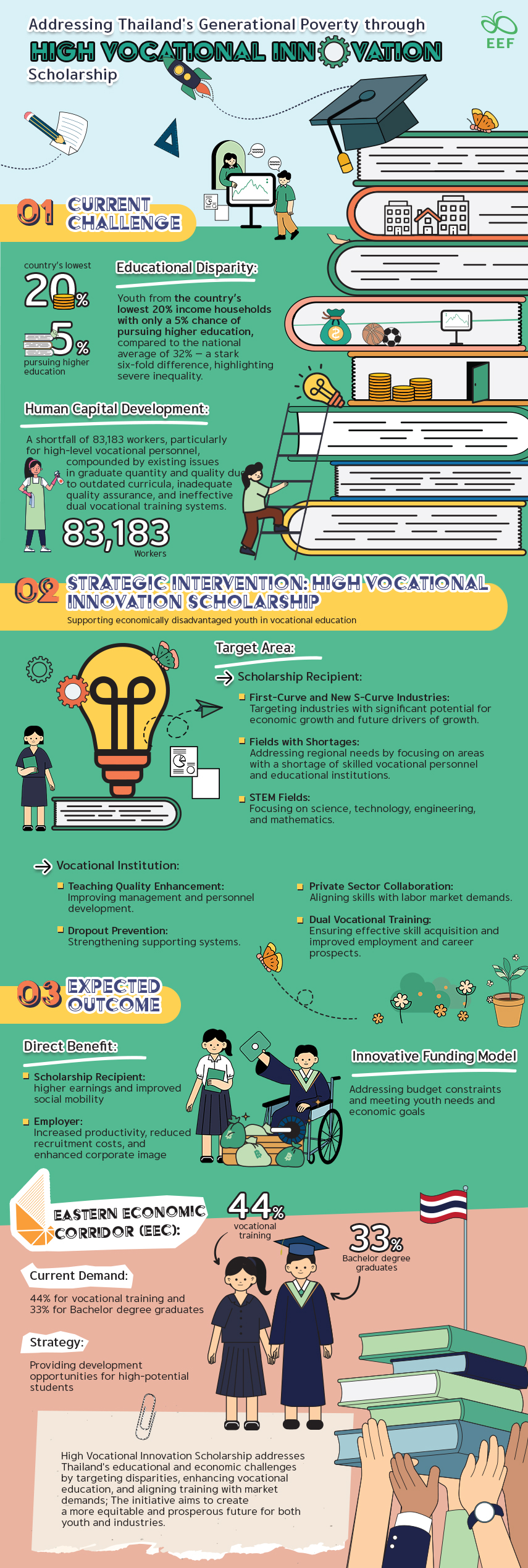
The difficulty for low-income students to pursue and complete their education was particularly evident in 2018, as Thailand grappled with significant educational disparities and human development challenges. Youth from the lowest 20% income households had only a 5% chance of pursuing higher education, compared to the national average of 32% — a stark six-fold difference. This inequality was compounded by a critical shortage of 83,183 skilled workers needed for Thailand 4.0, particularly high-level vocational personnel essential for economic growth. Further exacerbating the problem were inefficiencies in vocational educational systems — such as outdated curricula, inadequate quality assurance, and ineffective dual vocational training. To combat these issues, the Equitable Education Fund (EEF) Thailand implemented a dual-pronged approach. It launched the “High Vocational Innovation Scholarship” to help economically disadvantaged youth access higher vocational education, targeting Industries with significant potential and future industries, or “First-Curve” and “New S-Curve” respectively; fields facing skilled labor shortages; and STEM fields. Meanwhile, the EEF worked to strengthen vocational institutions by improving teaching quality, preventing student dropouts, and aligning skills training with labor market demands through collaboration with the private sector. Notably, by promoting effective dual vocational training, the initiative ensured students gained relevant skills, secured employment, and enhanced their career prospects, all in line with the broader goals of equal educational opportunities and social mobility. Despite budget constraints, expected outcomes include higher earnings for recipients, increased productivity for employers, and a positive social impact. As industries in the Eastern Economic Corridor (EEC) require a 44% rise in skilled vocational workers, this comprehensive strategy supports high-potential students while addressing both educational inequities and economic challenges.
Addressing Thailand’s Generational Poverty through High Vocational Innovation Scholarship

High Vocational Innovation Scholarship addresses Thailand’s educational and economic challenges by targeting disparities, enhancing vocational education, and aligning training with market demands; The initiative aims to create a more equitable and prosperous future for both youth and industries.
The Equitable Education Fund (EEF) Thailand is advancing educational equity through its Education Security System, focusing on economically disadvantaged groups. Addressing these disparities, the system confronts the pressing issue of reintegrating nearly 394,000 dropouts, while also enhancing teacher quality and fostering collaborative policies. Financial barriers also hinder access to higher education, with rising costs limiting opportunities despite scholarships. In response, EEF’s High Vocational Innovation Scholarship addresses skill shortages, linking education with employment through enhanced vocational training. Amidst these efforts, supportive schools and teachers play a vital role in mitigating dropout risks and maintaining student engagement and success, and EEF’s policy recommendations chart a dynamic roadmap for a more inclusive and equitable educational system, ensuring a future where every student’s right to education is realized through equitable and innovative solutions.

